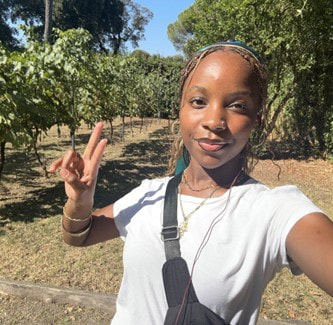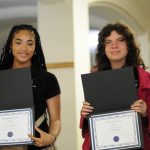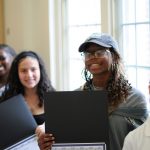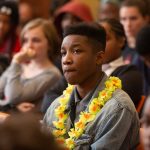Why did you want to go abroad?
I wanted to understand others. As a psychology major, I seek to understand how our thoughts manifest through interactions with the world. Culture is a major component of how we develop and move throughout this life. When I applied for the Baldwin Prize travel award, I had never been to another US state more than a few hours’ drive away, let alone on a plane. Acknowledging the vast differences that exist in America, I understood that experiencing culture abroad could open my eyes even further to the pillars of our shared humanity.
How did you choose where you would study? What factors motivated you?
I have always had an interest in mythology. Greco-Roman mythology in particular meshes beautifully with the true history of Rome and provides countless artistic pieces retelling the myths. While studying in Rome, I was able to enroll in two courses: Ancient Roman Mythology and Architecture and Genius Artist in The Genius City. The actual study portion of my study-abroad experience was extremely fulfilling and enriching. Thanks to Rome’s walkability and infrastructure, I spent the majority of the instructional time in my courses exploring the city, visiting museums, mausoleums, famous statues, fountains, and more.
What were you expecting before you departed?
Having never traveled alone before, I was expectantly anxious. The uncertainty of being alone in a new place was overshadowed by anxiety about making a mindless mistake like missing my flight. Of course, when the day arrived to depart, everything went smoothly. I put ample time and care into preparing. The Baldwin Prize helped me secure my passport, which eased a lot of stress. On my end, I did endless research on the weather in Rome, the public transport system, necessary safety measures, appropriate attire, how much spending money I would need, the currency exchange, and anything else you could think of in preparation for a trip.
How was your program structured? What did your days and weeks look like?
I was fortunate to have classes on Tuesdays and Thursdays only, 6 hours every day. As I mentioned before, there was a lot of walking. While the heat did make it regrettable sometimes, I much preferred being out and experiencing the city in contrast with sitting down for 3 hours straight being lectured. Some of the sites I had the pleasure of visiting during my classes were The Vatican Museums, St. Peters Basilica, The Barberini Palace, The Borghese Gallery, Villa Farnesia, The Moses Fountain, The Spanish Steps, The Church of Saint Ignatius in Campo Marzio, and many more churches. Other than the few mandatory program meetings with my trip organizer, the Council on International Educational Exchange (CIEE), all of my time was my own. CIEE had optional events, such as pottery-painting, pizza-making class, and performing arts events that students could attend. They also hosted day trips to Pompeii and Villa D’Este. Both sites were beautiful, but Pompeii was a full-circle experience for me. I never would have imagined that I would stand in the very place whose history I was so fascinated with upon discovering it for the first time so many years back in middle school. I also took a solo day trip to Florence, a two-day trip to Sorrento with some of my peers, made dinner with a friend at their homestay, experienced Roman nightlife, tried a lot of restaurants, and did tons of shopping. I was lucky enough to meet up with an old teacher and mentor of mine who happened to be in Rome at the same time. Even interactions such as that one that seem so small truly mean a lot when you’re in a new place with few familiar faces. I stayed in the neighborhood of Prati, and almost every day I was presented with a reason to walk along the beautiful Tiber River. Along the Tiber is a cafe called Biblobar, where I grabbed breakfast and spent many mornings, reading and finishing assignments.
Describe the type of people you met.
While there were other people of color in my cohort, to my knowledge I was the only person who self-identified as Black. My cohort within the program wasn’t especially community-oriented. I often felt alienated. As a result, I didn’t sustain many meaningful connections with the majority of my peers. Outside of my program, I had a mix of positive and negative experiences with Italians. The workers at Tonnarello’s restaurant were extremely friendly and posed for a picture as I photographed the restaurant. Bartaruga, arguably one of my favorite places in Rome, I frequented with my friend Leah. The staff is extremely warm and hospitable, often joining in on mine and Leah’s conversations and adding all the more depth to them. I ran into Black Italians and tourists who lit up at the sight of my presence, even garnering a “Welcome to Rome, my sister!” I also ran into locals who made rude remarks, such as “What is she doing here?” I opted to focus on the positive during my trip, and I did form meaningful connections with a few people.
Were you surprised by anything you experienced? If yes, what surprised you?
Traveling abroad, especially to a European country, I anticipated certain reactions. While I had some expectations of microaggressions and discrimination from locals and other tourists, I did not expect to see myself and some of my fellow students treated this way by our fellow cohort members. This was disappointing and made all the more frustrating by CIEE. CIEE did not do enough to prepare all students for the social and cultural differences they might experience in their host country and to make students aware of the mental, emotional, and cultural baggage all of us were bringing with us and would need to unpack. This was a significant failure on CIEE’s part. Travel is not simply about what you can see of the world. It’s about the mirror the world puts up to you. I wish CIEE had helped my classmates see more of themselves. I discussed all of this early on with the Baldwin Prize, and I navigated it with their full support.
Describe one or two people you met who really stood out to you.
Three people stood out to me during my time abroad. The person whose acquaintance I’m most grateful for is my friend Leah. I constantly felt othered, but not by Leah. She was a breath of fresh air. We talked for hours. We found comfort in our similarities and interest in one another’s differences. She was my companion for many trip highlights. Another fulfilling connection I made was with Johnny, a philosophy major, and one of the only other people who would speak in my classes. Johnny and I engaged in meaningful conversations about our course content, social interactions and so much more. Johnny’s most memorable trait for me was his ability to be an instant tour guide, as he would always know the most meticulous facts and obscure stories about the places we visited that our professional guides weren’t aware of. Beyond my own interest and interactions with Johnny, my academic endeavors while abroad were made gratifying due to the dedicated work of our professor, Kevin. His teaching style is extremely engaging. He teaches with the goal of leaving students with long-term memories of the content. I was able to see connections in what I was learning with previous information and new experiences I had while exploring the city outside of class.
Will this experience change anything you do or the way you think going forward?
Yes. Next time—and there will be many next times—I would definitely prefer to go to a country where more people who look like me are living in leisure and not only in labor, where my skin and physical features are not an anomaly. I would also prefer to travel with at least one person I know and trust. Navigating a new place is much easier when you have someone who understands you and is looking out for your wellbeing just as much as you do for them.
What are your recommendations for other young people who might be considering doing this?
Do it! We need more people to experience the world and understand that despite the negatives, we are all united through our shared humanity. We especially need more Black students to study abroad. Putting yourself out there is how we rightfully normalize the presence of Black faces in every existing space. We deserve to experience all the beauty of the planet just as much as anyone else. I am beyond grateful to the Baldwin Prize; Mr. Foster; Lily O’Hara, who spent months helping me prepare for my trip; the donors; and everyone else who helped make this experience a reality for me.





